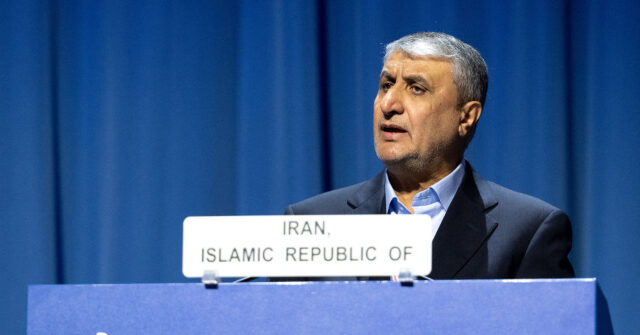Tehran welcomed the deputy science minister of Venezuela on Sunday for a meeting to discuss how to “enhance cooperation between the two countries in the nuclear industry,” the Iranian regime news agency Mehr reported.
Iran’s top nuclear official, Atomic Energy Organization (AEOI) chief Mohammad Eslami, reportedly said during the meeting that nuclear cooperation with the rogue Venezuelan regime was a healthy way to combat the “ambitious conduct of the hegemonic and arrogant system to dominate the resources of the countries,” an apparent reference to the United States. Iran is believed to possess an illicit nuclear weapons development program and is currently in talks with the government of President Donald Trump to establish an agreement that allows Iran to possess peaceful nuclear energy without developing bombs. Those talks were recently postponed as the White House expressed frustration with the intransigence of Iranian negotiators.
The U.S. nuclear talks did not appear to be a topic of conversation when Venezuelan Deputy Minister for Science and Technology Alberto Quintero met with Eslami on Sunday, outside of vague references to America as a global power. Eslami instead emphasized the importance of nuclear development alongside Venezuela.
“Venezuela is a country with great potential and I hope that these meetings will be effective in strengthening relations between the two countries,” he said, according to the Mehr News Agency. “A good and dignified path is a path that provides and guarantees the independence of a country and its people.”
Quintero credited Tehran with allowing Venezuela — once the wealthiest country in Latin America, but now among the poorest after two decades of socialism — to develop academic research in nuclear physics.
“Fortunately, in recent years, we have established good cooperation, and with your help, we were able to launch the nuclear physics department at the Venezuelan University of Sciences,” Quintero reportedly said. “We are also trying to launch masters and doctoral degrees in this field at the Venezuelan Center for Scientific Research.”
Quoted in the Spanish-language Iranian propaganda outlet HispanTV, Quintero continued, “Venezuela has 200 years of history on the road towards independence.”
“The issue of independence is not limited to the energy sector, but also includes other areas such as industry, sanitation, agriculture, and nutrition,” he continued. “We are willing to cooperate with the Islamic Republic of Iran so that we can achieve independence in these areas, as well.”
Venezuela is not a nuclear power and, as home to one of the world’s largest known oil reserves, relies almost exclusively on oil for its energy. The socialist regime has participated in events at the International Atomic Energy Agency (IAEA), however, and expressed interest in developing peaceful nuclear technology for medical and other uses. Venezuelan state media noted in September during the country’s past participation at the IAEA that it seeks to establish “peaceful nuclear development.”
Hugo Chávez first attempted to establish mass consumption of nuclear energy in the country in 2010, signing an agreement with the Russian firm Rosatom to build three nuclear reactors in the country. Chávez notably visited Iran immediately after signing that agreement in Moscow. At the time, observers warned that Venezuela developing a nuclear industry could allow rogue states such as Iran to increase their own development, as Venezuela is believed to possess significant uranium resources.
The Rosatom plan never materialized, however, as Chávez canceled the plan following the 2011 Fukushima nuclear disaster in Japan. Maduro announced in February 2024 that Venezuela was once again interested in “peaceful nuclear energy” alongside Russia.
Venezuela, controlled by the violent socialist regime of dictator Nicolás Maduro, has prioritized its friendship with Iran for decades following the late Hugo Chávez’s election to the presidency in 1999, which ended Venezuelan democracy. The Iranian Islamist regime often supports Venezuela through investments in its oil industry and opposition to sanctions and other diplomatic actions to punish the Maduro regime’s systematic repression of its citizens and threats of war and invasion against neighbors such as Guyana.
In the energy sector, Venezuela and Iran have most often cooperated on oil refinement, development, and shipment. Reports in 2022 indicated that Caracas was relying on Iranian-linked ships to sell its oil internationally, violating U.S. sanctions. That same year, Iran’s oil minister at the time, Javad Owji, announced that Iran had finished a program to rehabilitate the decrepit El Palito oil refinery in Venezuela and would begin refining 100,000 barrels of crude a day there. A year later, Iran and Venezuela announced a joint program to build an oil refinery in Homs, Syria, in cooperation with the regime of dictator Bashar Assad, but that plan never materialized and Assad was ousted from power by the Sunni jihadist organization Hayat Tahrir al-Sham in December 2024.
Venezuela’s proximity to Iran has also allowed the socialist regime to develop firm ties to several members of Iran’s global terrorism network, most prominently the Lebanon-based Shiite jihadist terror organization Hezbollah. Defecting diplomats have accused the Maduro regime of selling authentic, but illegitimate, Venezuelan passports and other identification documents to Middle Eastern nationals with no connections to the country, many of them believed to be associated with Hezbollah and similar jihadist groups.
Follow Frances Martel on Facebook and Twitter.
Read the full article here


